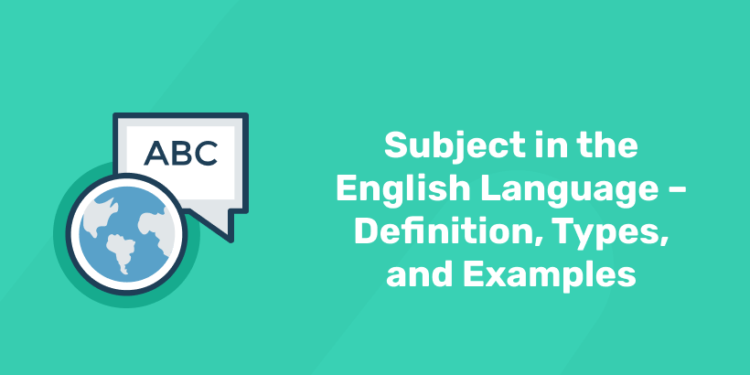Table of Contents
Learning English is a real task. But if you begin with the right strategy, you can create magic. Learn from the basics to master the language quickly and easily. Now, What is the significance of the subject in a sentence?
When you start learning about the basic components of a sentence, you begin with the subject. The subject is the core element of a sentence. Language is unique and complex at the same time. However, you should keep in mind that the English language is a combination of words, phrases, sentences, and clauses.
In short, learning about the sentence can help you to achieve clarity and precision while handling language. Once you start your language journey, the first thing that you learn would be about subject and predicate. Subject and predicate constitute a sentence. Know more about the subject, definition, uses meanings, etc here.
Elevate your speaking skills with our Spoken English Course!
Subject In English Grammar
Firstly, let’s learn about sentences in the English language.
Sentences are composed of words that make complete sense while conversing with others. A sentence comprises a subject and a predicate. A sentence can make complete sense of the action going on.
The subject is the key in every sentence. Now, let’s learn about the subject
A subject in a sentence can be a noun, noun phrase, or pronoun. A subject is the one who carries out the main function in the sentence. Usually, a subject can be identified at the beginning of each sentence. If there is more than one adverb or adjective found in the sentence, the place of the subject may change.
Furthermore, a subject can be a noun, noun phrase,e, or pronoun that can easily spot the person or thing that acts as a verb. In addition, the subject is also regarded as the noun, noun phrase, or pronoun about which something is described. The subject can also appear in passive sentences.
Moreover, the subject can also be regarded as the doer of the action in a sentence. Also, it can be a person or thing that plays a key role in the sentence. The whole sentence is about the subject. Importantly, the whole sentence is constructed for the subject and at the same time around the subject.
Start speaking English like a native with our comprehensive course.
On the other hand, the subject can also be regarded as the person or thing who does the action demonstrated by a verb in a sentence. Further, the subject can be a noun or noun group on which predictions are presented.
In short, the subject can be considered the doer of the various acts in the sentence. For instance, the subject pronouns in English include I, you, we, he, she, it, who, they, whoever, etc
In summary, Sentence is the most essential component in the English language. The subject is the doer of the action in a sentence. The word itself talks about the action-doer in the sentence. The word which acts as a sentence is what we call a subject.
How to Identify a Subject?
A subject in a sentence can be easily identified with the help of turning the subject into yes or no questions. You can reverse the order of the subject and first verb to change a plain sentence into a question.
For instance,
- He can prepare the meal
You can reverse between the subject and verb in the following way,
- Can he prepare the meal?
Now you can finally come to the solution as the doer of the action, that is, the preparation of the meals is none other than “he”. Therefore, “he” is the subject of the sentence.
Elevate your speaking skills with our Spoken English Course!
Types of Subjects
A simple sentence usually takes only one subject. It can be a proper or improper noun or a personal pronoun as the subject.
Now, let’s look into the various cases
Subject: Proper Noun
In certain sentences, the subject can be a proper noun. It can be the name of the person, place, or thing. A proper noun can denote the name of a person or thing. For instance,
- Tony Morrison is a famous writer
- Reena is participating in the violin competition
- The Nile river is the longest
- Regan left the cheese on the table
As the subject is a proper noun in all the cases, it’s easy to identify.
Subject: Improper Noun
According to the proposed grammar rule, the Improper noun can also be used as a subject in the sentence. An improper noun can act as a common noun. A common noun is a name given to a thing, class, or place. For instance,
- The cat is strong
- The dog
- The river is overflowing now
- The city is crowded
Subject: Personal Pronoun
The personal pronoun is substituted for a noun. Personal pronouns can act as the subject of a sentence. For instance,
- He is clear
- She is not going
- She is an intelligent girl
- They speak English well
- You can take care of the candidates
Subject: Interrogative Pronouns
Interrogative Pronouns can also act as simple subjects in a sentence.
For instance,
- Who turned the lights off?
- Who troubled her?
- Which is the right path?
- Who did this crime?
Complex Subjects
Complex subjects are a combination of more than one subject in a sentence. In other words, it can be the combination of a proper or improper noun joined with a modifier. For instance,
- The cat who was sitting in the corridor meowed at us
- people from small towns are migrating to cities
- Indian students are trying to communicate more with delegates
Compound Subjects
If a sentence has more than one subject or more than one person performing the same core task, then the subject is considered a compound subject. For instance,
- Meena and Rahul are friends
- Cats are rats are born enemies
- India and Pakistan fight with each other
- Cars and buses are the basic modes of transport
Sentences- Points to Ponder
While using a subject in a sentence, you should be very careful. Basically, you can keep the points mentioned below.
- In the case of assertive or declarative sentences, subjects are usually spotted at the beginning of a sentence.
- In an interrogative sentence, the subject assumes a different position. To be precise, the subject and the verb assume a reversed position
- However, the subject is absent in imperative sentences
- In exclamatory sentences, the subject appears after the interjection
- Compound subjects or in other words multiple subjects can also be used in a sentence
- Simultaneous actions are possible for the subjects in compound and complex sentences.
- In certain cases, gerunds can also perform the function of subjects in a sentence based on the context.
Start speaking English like a native with our comprehensive course.
Subject in Sentences : Examples
Now, the learners can identify the subjects in the below-given sentences
Sample Question: 1
- Roshan will arrive at the station tomorrow
- The interviewer asked the most difficult questions
- You have passed the exam
- Did he find out who her uncle is?
- The books on the shelf are about ancient civilization
- Rachel is my best friend
- My father will attend the function
- We have to go for the dinner
- The English teacher taught us the vocabulary lessons today
- We kept quiet
- Merla is performing today
- She went to the stage
- I posted the letter
- My mother promised to buy a new car
- This car belongs to me
- She is my class teacher
- Varun forgot to take lunch
- I arrived early
- You should have called me
- Rahul works in an IT company
- We are watching the new movie
- The band is performing today
- My mother cooks delicious food items.
- On Saturday, all parents are called for a meeting
- The mobile phone is not working properly
- The association inauguration will be conducted tomorrow
- Your ring is shining
- Learning grammar can improve your speaking skills.
- The adults were preparing pickles in the kitchen
- I was listening to my grandmother
- Mitu is my best friend
- Carol’s song competition will be held tomorrow.
- Our English teacher gathered us
- We screamed out of fear
- You should be careful
- The employer meets us
- They are having dinner
- Mike works hard
- I am hungry
- My father will arrive at any moment
- It is my pet dog
Here is the solution to the above-given questions. Make sure you find it with all your might to learn better.
- Roshan will arrive at the station tomorrow
- The interviewer asked the most difficult questions
- You have passed the exam
- Did he find out who her uncle is?
- The books on the shelf are about ancient civilization
- Rachel is my best friend
- My father will attend the function
- We have to go for the dinner
- The English teacher taught us the vocabulary lessons today
- We kept quiet
- Merla is performing today
- She went to the stage
- I posted the letter
- My mother promised to buy a new car
- This car belongs to me
- She is my class teacher
- Varun forgot to take lunch
- I arrived early
- You should have called me
- Rahul works in an IT company
- We are watching the new movie
- The band is performing today
- My mother cooks delicious food items.
- On Saturday, all parents are called for a meeting
- The mobile phone is not working properly
- The association inauguration will be conducted tomorrow
- Your ring is shining
- Learning grammar can improve your speaking skills.
- The adults were preparing pickles in the kitchen
- I was listening to my grandmother
- Mitu is my best friend
- Carol’s song competition will be held tomorrow.
- Our English teacher gathered us
- We screamed out of fear
- You should be careful
- The employer meets us
- They are having dinner
- Mike works hard
- I am hungry
- My father will arrive at any moment
- It is my pet dog
Join our Spoken English program today and communicate with ease!
Learning the basics of the English language can help you boost your spoken English skills. Non-native speakers can utilize a comfortable environment to learn how to handle the language most effectively.
Entri team is providing an opportunity for non-native speakers to improve their language skills. The recorded audio and video classes, quizzes, communication labs, flashcards, one-to-one mentoring sessions, and group discussion platforms are the techniques used by the course, English Padiykkam with Inverted Coconut to facilitate the learning. The daily assessment sessions and assignments can make you proficient in language from the beginner’s level.
Aparna Mulberry, the native speaker will help you to build a foundation that is firm and stable in the English language. You can master the language within a few months with proficiency. Furthermore, the course is designed in such a way that it will help you to equip yourself with Pronunciation, Articulation, Voice Modulation, Grammar, and Intonation techniques.
The course covers the basics to the complicated level of the language. If you wish to learn the nuances of the English language, the best mentor and resources are available at English Padiykkam with Inverted Coconut.











